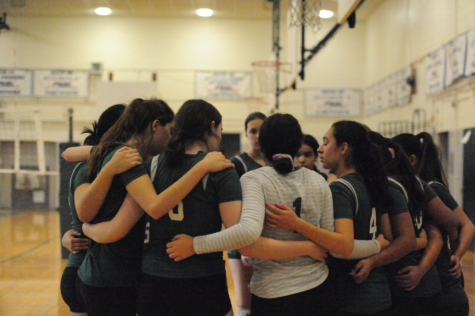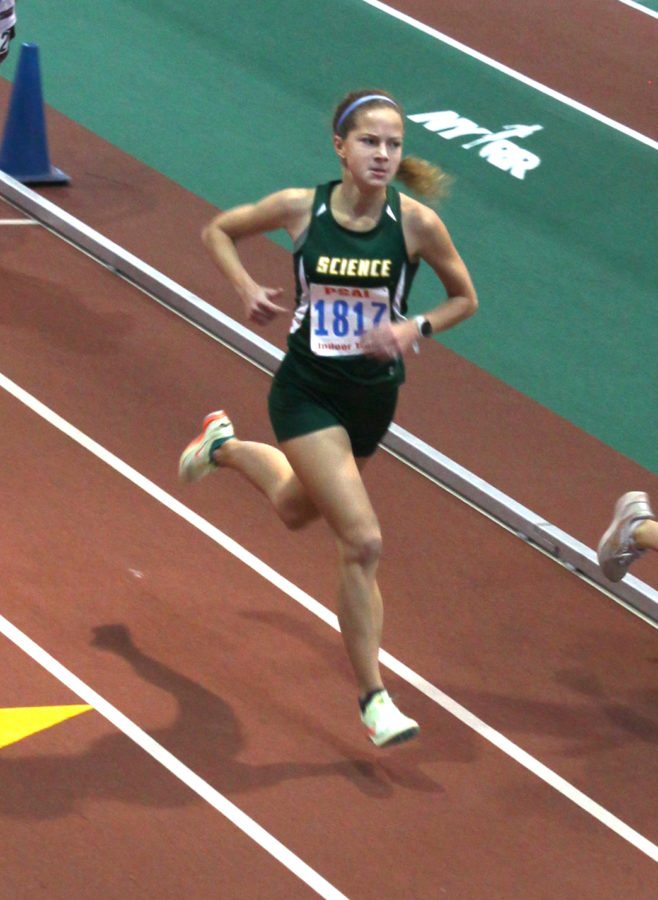Mind Over Matter: Physical Versus Mental Strength
A dive into the turbulent mind of the student-athlete.
Olivia Girand ‘23 won the PSAL Jim McKay 1500 meter race with a personal record of 4:54.60 and qualified for New Balance Nationals.
Whether it’s crossing the finish line, scoring the winning basket, or hitting an unreturnable ball, victory and achievement dominate our views of sports. Athletes are painted as unshakable and resolute, their physical and mental toughness a perfect model to strive for. But beneath the tip of this iceberg lies a treacherous sea, ready to engulf all who slip from the glacial peak.
In recent years, the conversation of sports injuries and physical fatigue has taken center stage. Injury prevention drills and strength training are daily practice for competitive athletes. Rules and regulations have been enforced in high-contact sports in order to limit long-standing injuries. The scope of physical damage has even extended to illuminate the negative impacts on mental health. Depression, eating disorders, and a loss of motivation have all been linked as side effects of the recovery process.
For instance, Maya Jowata ’25 suffered from a long-term injury that may keep her out of gymnastics for good and underwent leg surgery that forced her onto crutches for weeks. “When I first heard that I wouldn’t be able to do sports for a year, it took everything for me to keep from crying on the spot,” she said. “I felt horrible about the prospect of losing all my progress and being held behind while everyone else around me moved forward.”
After learning that her injury was chronic, Jowata was frustrated by her inability to run or participate in acrobatic activities. Since being forced to give up gymnastics indefinitely, Jowata feels like an important part of herself has been taken away. “To be part of a team that works to improve at something that I love, and to learn from each other was a wonderful experience,” she said. For Jowata, giving up that joy and team spirit has been challenging.
As one dives deeper into the mind of an athlete, they will see that anxiety and depression can be symptoms of more than just a physical injury. The stress of performance, competition, and work balance all chip away at an athlete’s mental health. Prominent athletes have broken the stigma and openly discussed the toll that competing has had on their mental health. Olympic swimmer Michael Phelps publicly relayed his history of depression, while gold-medal gymnast Aly Raisman discussed her difficulty coping with post-traumatic stress disorder.
With the discussion regarding the impacts of both mental and physical strength on performance, the ultimate question of which bears more importance is ever prominent. In particular, what stress burdens the student-athlete most: competition and school-sport balance anxiety, or muscle fatigue?

(Jacey Mok)
For Liliana Hersh ’25, a setter for the Girls’ Varsity Volleyball Team, the key to winning a game is rooted in mental toughness rather than physical capability. “The second you lose confidence in yourself and the team, everything goes wrong. You can have all of the physical skills but what’s blocking you from achieving your best is what’s in your head,” she said.
Challenges with mental health in sports are capable of hindering athletes from reaching peak performance. A roadblock in your mind can make it impossible for your body to access the physical capabilities it has spent weeks, months, and in many cases, years building. A sudden lack of desire to continue with a sport or a loss of confidence leading to undesirable results are often signs that an athlete is struggling with their mental health.
This connection can be demonstrated through medical explanations that connect mental health with physical performance. Panic attacks during competitions make it difficult for athletes to conserve oxygen, causing muscle fatigue, dizziness, and a loss of concentration. Due to constant exposure to competition and stress, athletes are vulnerable to depression and anxiety, both of which are linked to injuries and poor performance.
To cope with pre-competition anxiety, Hersh has started giving herself mental pep talks, exciting and preparing her for the game ahead. To release the stress that builds before an important volleyball match, Hersh said, “I don’t think about the stress of what might happen during a competition, but about moments in the past that I’ve done really well.”
Eliza Phua ’24, a year-round athlete, begins her athletic season as a member of the Bronx Science Girls’ Varsity Tennis Team, often finding herself under immense pressure during competitions. “I find it most helpful to just sit with myself and clear my head of pessimistic thoughts,” she said, “Allowing a bad day, practice, or opponent to get inside your head can easily ruin your performance.”
The mental training Hersh and Phua partake in has been proven to increase performance. A 2014 study in The Sport Journal proves that visualization of upcoming competitions and focus on process — not results — have a positive effect on physical capability. Mental imagery reduced anxiety in the test subjects and subsequently yielded better competitive results.
Olivia Girand ’23 is also a year-round athlete, captaining the Cross Country, Indoor, and Outdoor track teams. Girand is a remarkable athlete, winning second place in this year’s PSAL Cross Country City Championship. Often competing on a national level, she is no stranger to pre-race stress. “I train hard for races, but I worry that this work won’t show when I compete and that I will disappoint myself by not displaying my true ability,” she said.
To prepare for competitions, Girand tries to coax herself into a positive mindset. “I often journal the night before a meet,” she said. “I write down affirmations about how I am prepared and ready for the race, and I try to get myself excited, not scared, for the competition ahead.”
Girand agrees that both physical and mental strength are essential to an athlete’s success. In the end, improvement relies on being able to manage the stress of competition and a reduction of self-doubt. Physical advancement naturally stems from practice, but mental toughness is a constant endeavor. Girand said, “It takes a lot of discipline to train every day for a sport, even on days you might not want to, but mental strength makes one able to.”
Jowata similarly emphasizes the necessity for an athlete to have motivation, driving them to practice and refine their skills. “Physical strength can be gained through training, but the incentive to improve and gain physical strength won’t be either there or sustainable without the mental strength to power through the pain,” she said.
While mental challenges are present for all athletes, needing to balance sports and school adds another stress factor to students engaged in competitive teams. The daily battle of time management for the student-athlete often reduces leisure time and sleep — two essential contributors to a healthy mental lifestyle.
Hersh recounts that during the volleyball season, she often found herself getting home at 8 p.m. with homework still waiting to be done. After struggling with these late nights, she was forced into mastering the ability to manage her schedule. “I learned how to take advantage of SGI [Small Group Instruction] and free periods,” she said. “I like how the knowledge I’ve gained through volleyball has helped me in school and will continue to help me in the future.”
Extra strength training and drills are often left out of a student-athlete’s busy schedule. However, going this additional mile sets an athlete apart from their opponents. Physical training rectifies muscle imbalances while drills increase endurance and explosiveness, leading to quicker and more effective movements. Neuromuscular activation — the process in which the brain establishes pathways that send signals to activate various muscles — is ameliorated by strength training.
Every athlete can reap these benefits, but many often ignore exercises that do not seem to align with their sport. Distance runners often neglect explosive and upper body work, while endurance training is commonly overlooked by sports that involve sprinting.
The connections between physical training and improved mental health cannot be ignored. Building strength in muscles, bones, and tissues is vital for injury prevention, allowing athletes to absorb impacts, falls, and blows. Thus, strength training limits the depression that occurs from both mental and physical trauma, allowing an athlete to draw closer to their potential.
The mental health aspect cannot be left out of sports. More than constant physical training, it allows an athlete to achieve greater potential without an invisible barrier in their mind. For numerous athletes, stress from competition, along with high expectations, have an immense impact on their performance in a game and at practice.
Nevertheless, Girand highlights that mental benefits can derived from sports. “Exercising makes it easier to focus on my work later in the day and puts me in a better mood, which definitely helps me balance being a Bronx Science student and an athlete,” she said, “Additionally, I get endorphins from practice!”
Although Hersh continues to feel the stress of competition, her excitement emerges victorious from this battle of emotions. Her best source of healing and fulfillment comes from her fellow volleyball athletes. “You get a feeling of family on the team,” she said. “Because of this connection, I started to do well in competitions and actually enjoy them.”
For Phua, the difficulties of high-level athletics have their gains. “There is really something special about sharing the feelings of physical and mental drain, that brings people together,” she said.
The spirit of competition brings people together. Teammates work towards a common goal. They bring each other up and rise against the stress, pain, and hard work. The bond of friendships that are cemented in a sports team is stronger than stone or steel.
“The second you lose confidence in yourself and the team, everything goes wrong. You can have all of the physical skills but what’s blocking you from achieving your best is what’s in your head,” said Liliana Hersh ’25, a setter for the Bronx Science Girls’ Varsity Volleyball Team.
Rossitsa Mina Petrova is an Editor-in-Chief for ‘The Science Survey,’ where she is responsible for revising and editing the articles of her peers....
Jacey Mok is an Editor-in-Chief for 'The Science Survey.' She loves the art of masterfully crafting a story and bringing the reader into the scene. She...

